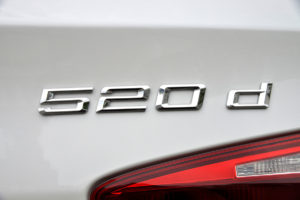This could be the start of bad times for German owners of diesel cars. Last week the Federal Administrative Court in Leipzig decided that German cities could ban diesel vehicles. Overturning a lower court’s ruling in a suit filed by environmental group Deutsche Umwelthilfe (DUH) against Stuttgart and Düsseldorf, the court’s decision allows municipalities to prohibit older diesels in an attempt to reduce pollutants. In this case, “older” vehicles means those built before the Euro 6 emissions limits went into effect in January 2017.

With proposed bans, even recent diesels like this F10 5 Series might be in trouble.
This was another blow to automakers and diesel-vehicle owners stemming from the 2015 revelation that Volkswagen was cheating on diesel-emissions testing. About 30% of cars in Europe are diesels; automakers have been lowering emissions on new diesels, but owners of older models will probably have a hard time getting decent prices for their used diesels, if they can find buyers at all. Used-car dealers already experienced large backlogs of diesels due to the uncertainty of whether cities could ban them. Since that question has now been answered, that backlog may grow.
Some German automakers have undertaken programs to update engine programming to make older diesel cars emit fewer nitrous oxides, but it’s likely that prohibitive actions by cities will still make many of the old diesels unsellable, if not unusable in those locations. Currently, only 2,700,000 of the 15,000,000 diesel non-commercial vehicles registered in Germany operate within the latest Euro 6 emissions standards.
While the court decision does not constitute an immediate ban, it does allow cities to move ahead with ban plans. The court advised municipalities to outlaw vehicles gradually by “exercising proportionality”—whatever that means. Industry analysts predicted that the percentage of new-car diesel manufacturing that hit a high of 52% in 2015 will be half that by 2025.
German government representatives attempted to reassure diesel owners by pointing out that no bans were imminent, while Chancellor Angela Merkel, who opposed the ruling, said such bans would be very localized and would not affect most diesel owners.
If bans are enacted, don’t expect to ever see this 1983 524td in Stuttgart again.
The effect on the German economy of this decision and reduced diesel-car manufacturing remains to be seen, but about 15% of the country’s GDP is related to the automobile industry. This may also squeeze the carmakers from different directions. Diesels have been helping the car companies meet their European Union emissions standards because diesels emit less carbon dioxide (CO2). If market demand causes them to produce fewer diesels, then they will have to increase production and sales of electrified cars to keep their corporate-fleet-emission averages moving in the right direction toward the EU’s 2021 targets. Failure could mean potential fines in the billions.
The current EU emissions standard is Euro 6b, which went into effect in January 2017. It brought maximum allowed emissions in Europe down to the same level that the U.S. has mandated since 2008.
The proposed bans in German cities are not unique; Paris, Athens, Mexico City, and Madrid plan to ban diesels entirely by 2025. France and the United Kingdom intend to ban the sale of all new internal combustion-based cars—gasoline and diesel—by 2040.—Scott Blazey
[Photo courtesy of BMW AG.]